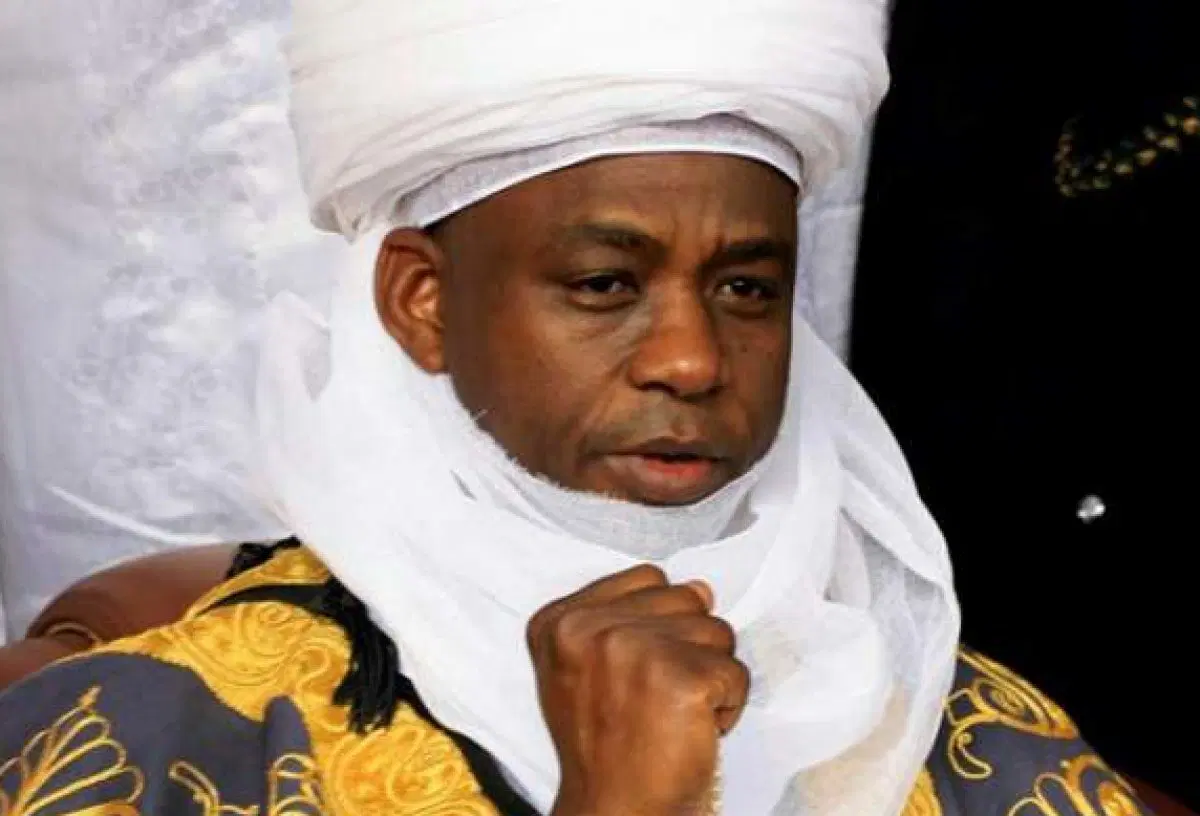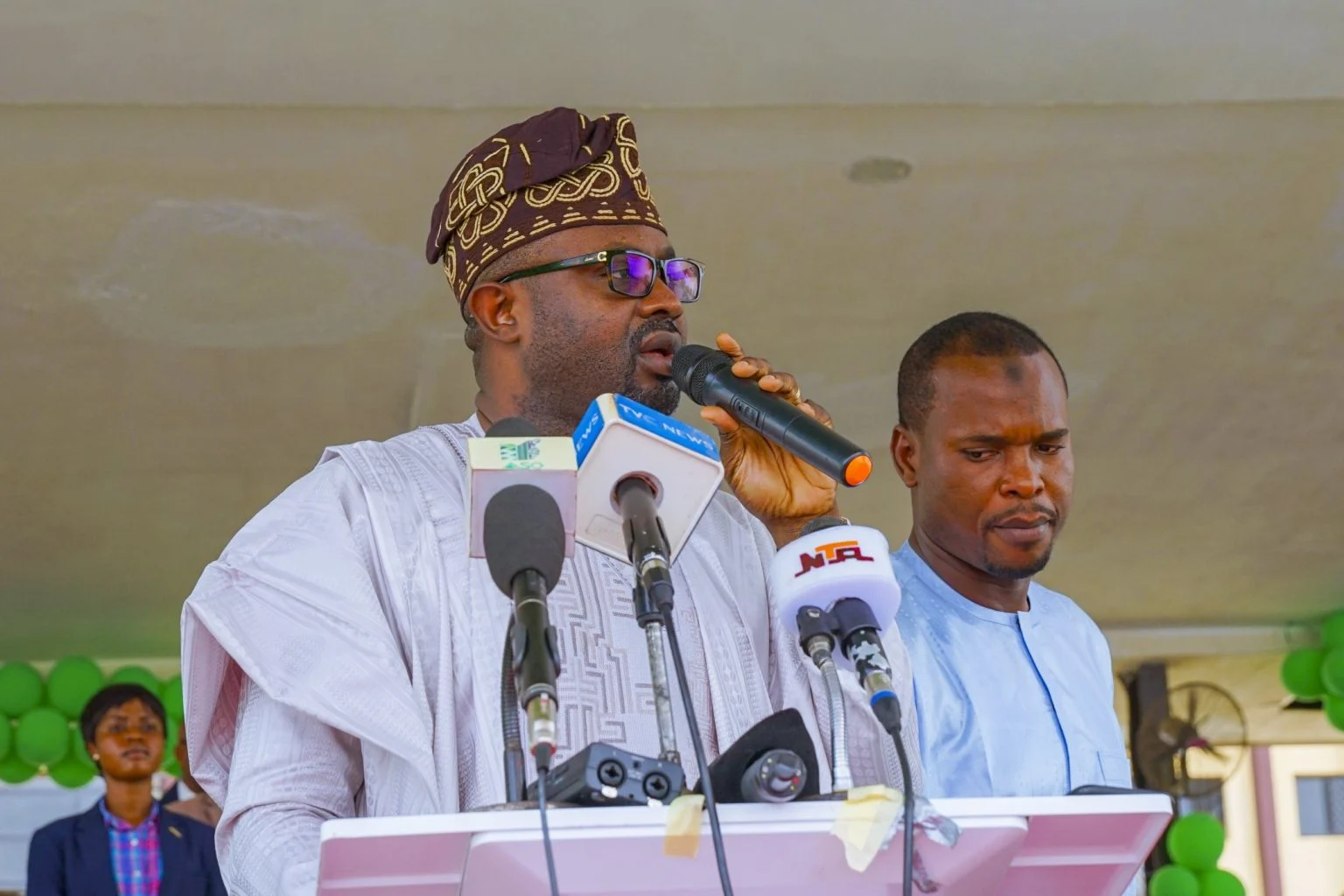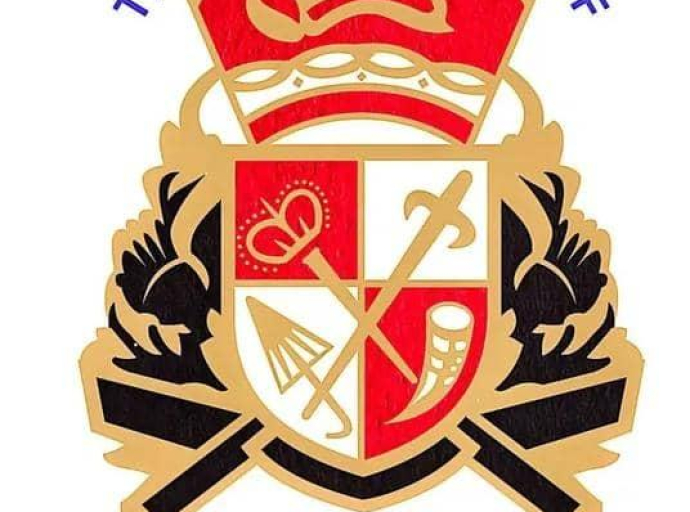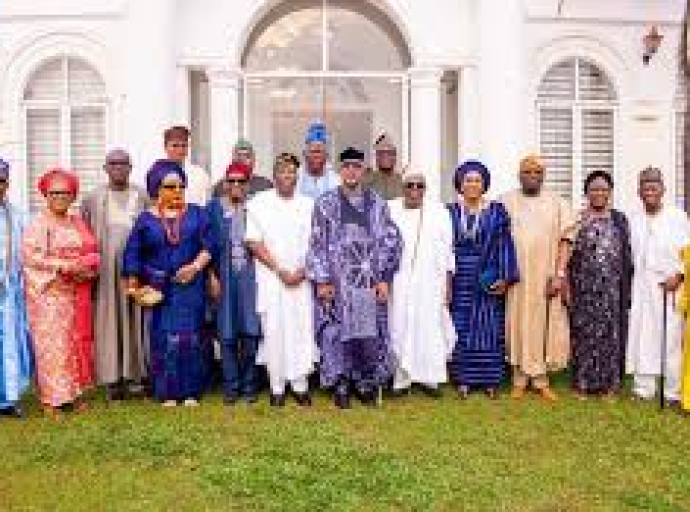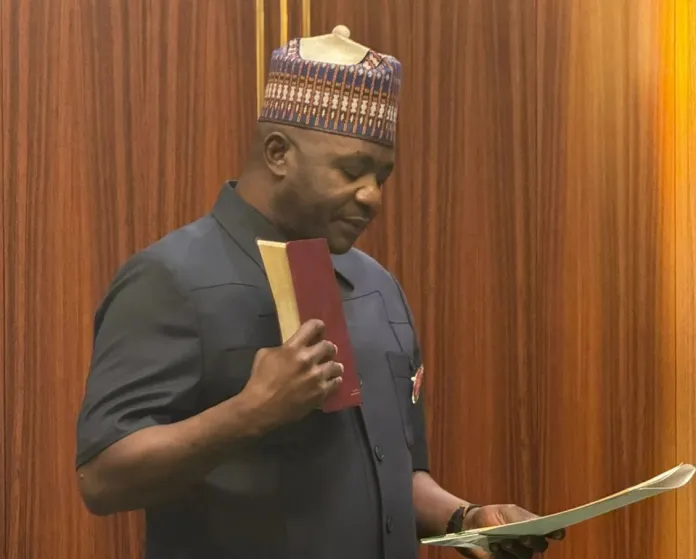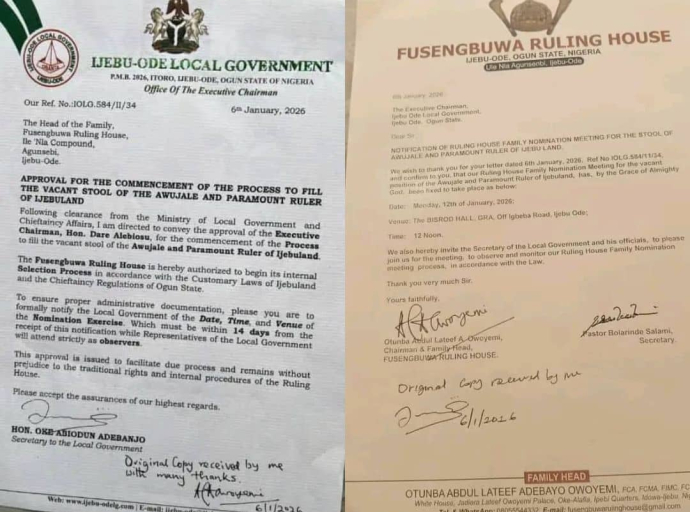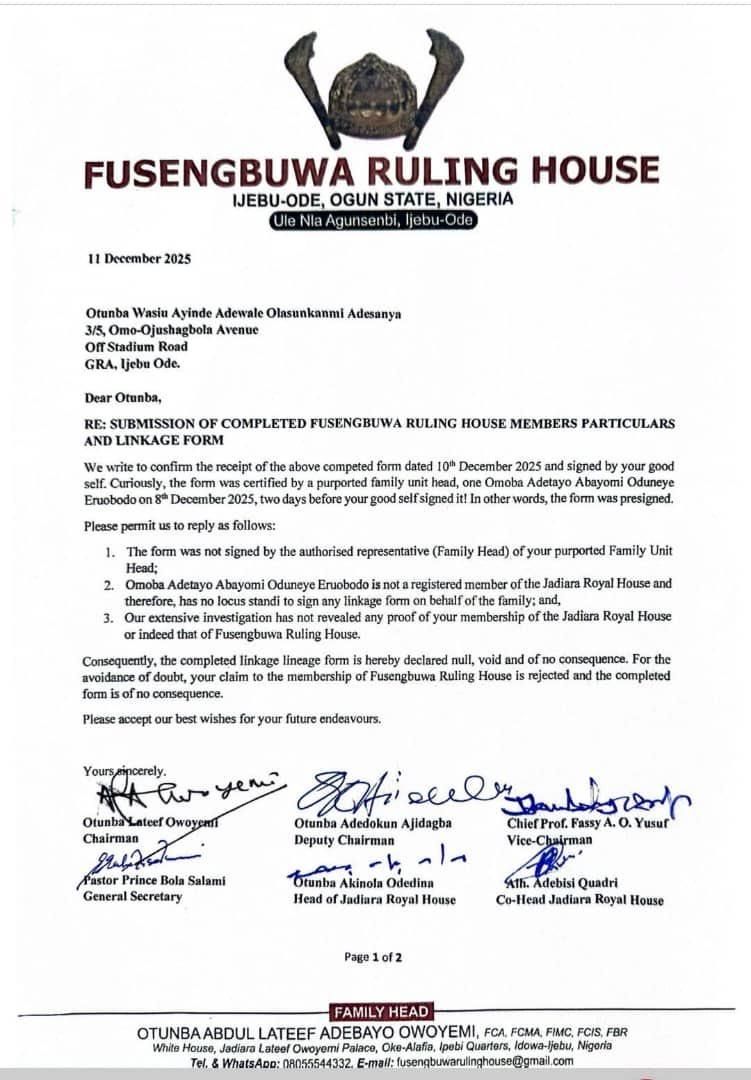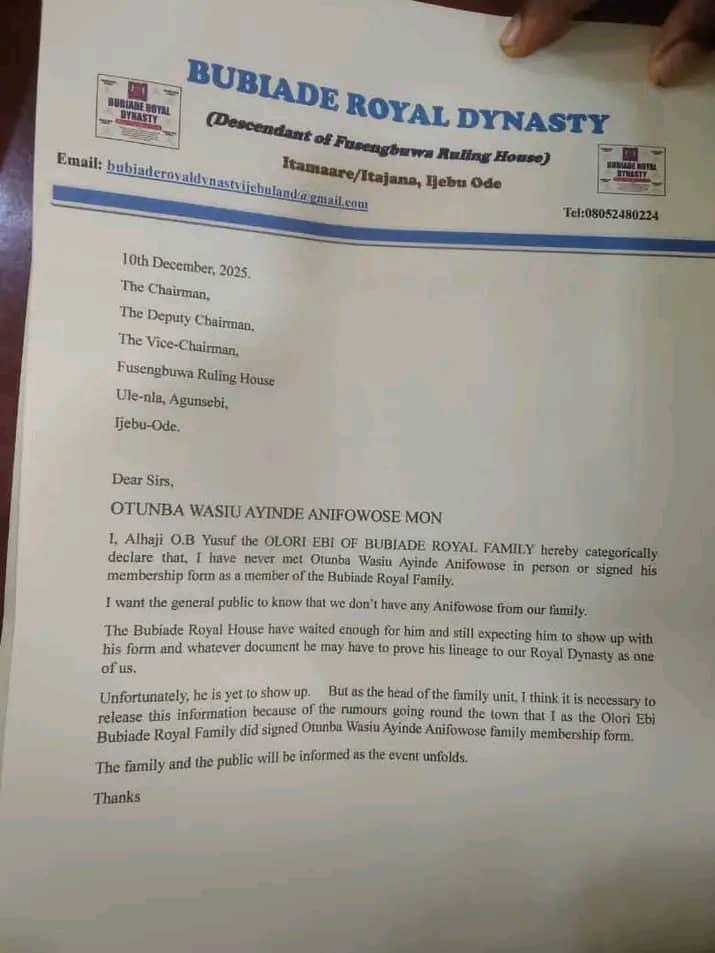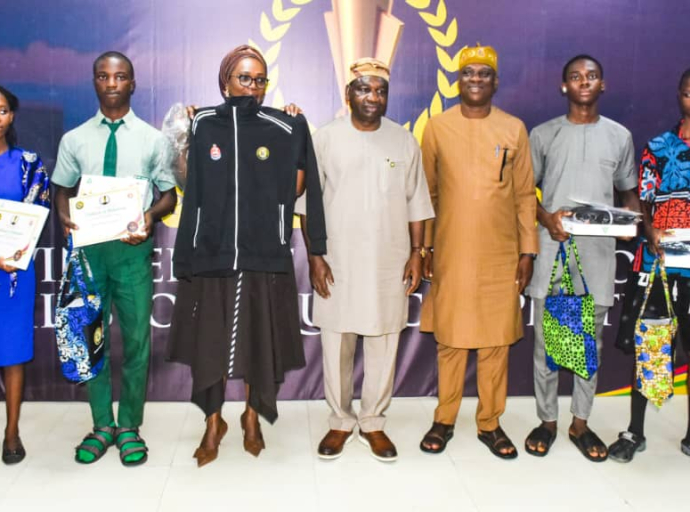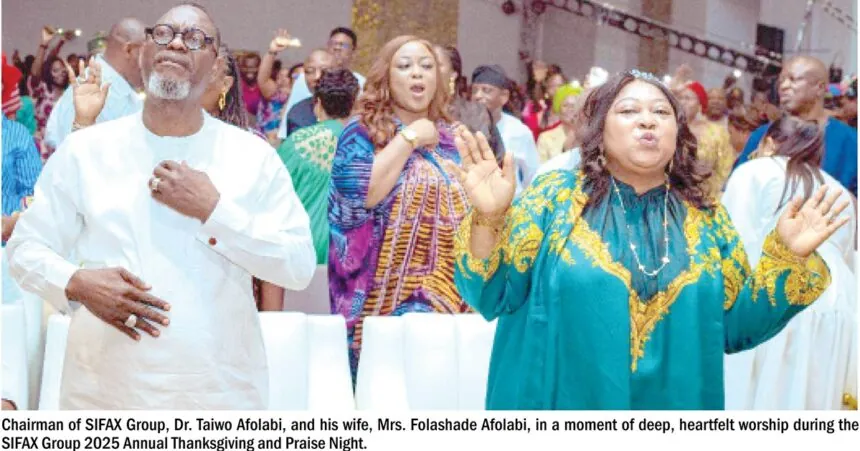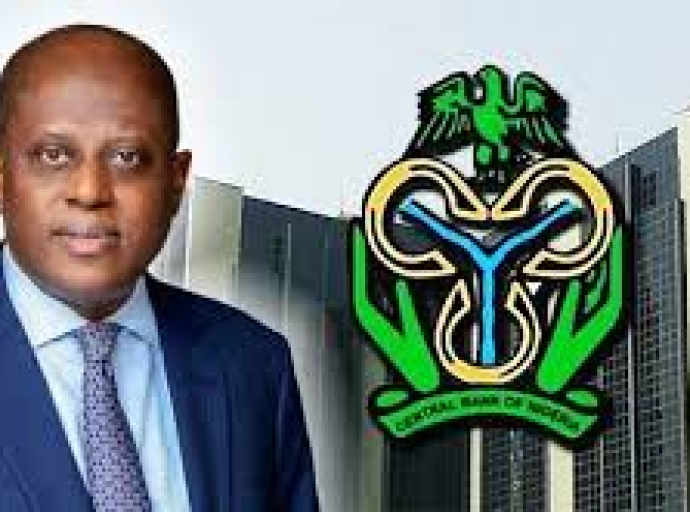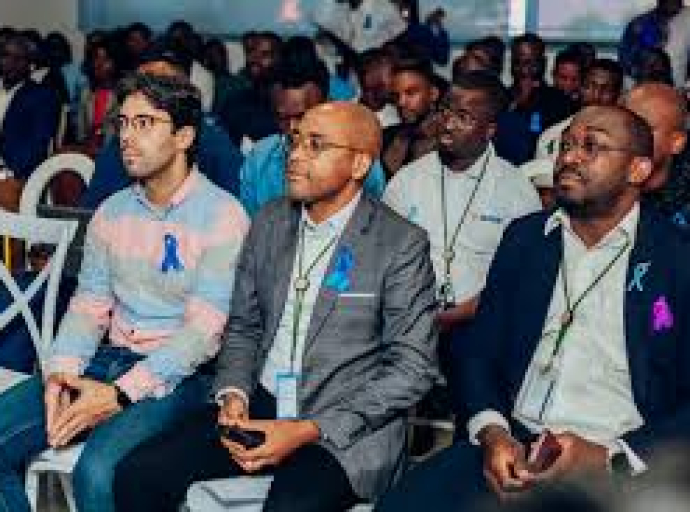
The Federal Government has declared Thursday, December 25, and Friday, December 26, 2025, as public holidays to mark Christmas and Boxing Day.
The government also declared Thursday, January 1, 2026, for the New Year celebration.
The declaration was contained in a statement issued on Monday by the Permanent Secretary of the Ministry of Interior, Dr Magdalene Ajani, on behalf of the Minister of Interior, Olubunmi Tunji-Ojo.
According to the statement, the minister urged Nigerians to reflect on the values of love, peace, humility and sacrifice associated with the birth of Jesus Christ.
Tunji-Ojo also called on citizens, irrespective of faith or ethnicity, to use the festive season to pray for peace, improved security, and national progress.
He further advised Nigerians to remain law-abiding and security-conscious during the celebrations, while wishing them a Merry Christmas and a prosperous New Year.
The statement added, “The Federal Government has declared Thursday, 25th December 2025; Friday, 26th December 2025; and Thursday, 1st January 2026 as public holidays to mark the Christmas, Boxing Day, and New Year celebrations respectively.
“The Minister of Interior, Dr. Olubunmi Tunji-Ojo, who made the declaration on behalf of the Federal Government, extended warm Christmas and New Year felicitations to Christians in Nigeria and across the world, as well as to all Nigerians as they celebrate the end of the year and the beginning of a new one.
“The Christmas season and the New Year present an opportunity for Nigerians to strengthen the bonds of unity, show compassion to one another, and renew our collective commitment to nation-building.
“The Minister wishes all Nigerians a Merry Christmas and a prosperous New Year.”
The Jadiara Royal House of Ijebu Ode has dismissed the claim by the popular Fuji musician and Olori Omooba of Ijebuland, Wasiu Ayinde Anifowose, also known as KWAM 1, that he belongs to the royal lineage.
The family, in a letter dated 7th December 2025, signed by the Olori Ebi, Otunba Prince Akinola Odedina and addressed to the Fuji musician, categorically stated that Wasiu Ayinde “has no genealogical lineage to Jadiara Royal House.”
He explained that the Royal House had patiently waited for him to submit his nomination form, as directed by the Chairman of the Fusengbunwa Ruling House, Otunba Owoseni, to prove his linkage to the family.
Odedina said it became necessary for the royal house to speak on the development, since the issue had become a matter of public interest.
The letter reads, “I have observed with studied silence the event of the past few days concerning the issue pertaining to Otunba Wasiu Ayinde Anifowose and his aspiration to the Awujale stool through Jadiara Royal House
“I can say categorically that Wasiu has no genealogical lineage to Jadiara Royal House.
“The Chairman of Fusengbuwa Ruling House has rightly given him a nomination form to complete expecting him to get his root to Jadiara Royal House authenticated.
“We in Jadiara Royal House have waited for him to show up with his form and whatever documents he may have to prove his linkage to Jadiara Royal House. He is yet to show up
“It is necessary to release this information because the issue has become a matter of public interest
“The public will be informed as the event unfolds.”
If you recall, the Fuji musician , fondly called K1 De Ultimate, in a letter addressed to the Chairman of Fusengbunwa Ruling House, dated 3rd of December, declared his intention to be considered for the vacant stool of Awujale of Ijebu land.
He stated that his intention was subject strictly to the provision of Ijebu customary law and the Ogun State Chieftaincy laws.
“I was born on the 3rd of March ,1957, and I am a bonafide son of the Fusengbunwa Ruling House of Agunseb Quarters, tracing my ancestry to the Oba Jadiara lineage, which qualifies me to present myself for consideration in accordance with established tradition,” he said.
As the race for the throne of Awujale of Ijebuland,hots up,not fewer than 95 people, consisting of 94 princes and one princess from the Fusengbuwa ruling house of Ijebu Ode, emerged on Monday as contestants for the vacant stool of the paramount ruler of Ijebu land.
The contestants emerged at a nomination meeting held by the ruling house at Bisrod Hall, GRA, Ijebu Ode, Ogun State.
The nomination meeting was presided over by the Chairman of the ruling house, Otunba Abdulateef Owoyemi; his deputy, Prince Adedokun Ajidagba; and the Vice Chairman, Prof. Fassy Yusuf.
The Secretary to the Ijebu Ode Local Government, Abiodun Oke, and some other local government officials were present as observers.
Dr Kunle Hassan a renowned opthamologist,founder of Eye Foundation,Lagos big boy,Omooba Abimbola Onabanjo,Ijebu Businessman,Olabode Onanuga, CEO of Aroon Construction company, Fatai Arowolo, Biodun Onanuga, husband of the immediate past Deputy Governor of Ogun State, are among the 95 princes and princess who have indicated interest in occupying the vacant throne of the Awujale of Ijebuland.
The contestants at the nomination meeting were represented by two of their relatives.
One of the relations moved the motion for the nomination, while the other seconded it, after which the family registered the nomination as accepted.
Speaking with journalists at the end of the nomination meeting, the family head of Fusengbuwa, Owoyemi, lauded family members for conducting themselves peacefully and ensuring that nothing untoward occurred that could jeopardise the nomination process.
Owoyemi said that, just as the Ifa oracle had foretold, the family was working across the board to ensure that whoever would assume the vacant Awujale stool would further take Ijebu land to greater heights.
The family head and former President of the Institute of Chartered Accountants of Nigeria said, “We thank God that what we have feared so much has finally come and gone peacefully.
“We have successfully, peacefully and harmoniously nominated our candidates, 95 of them. It is now left in the hands of the kingmakers to do a very good job conscientiously and pick one of them as the next Awujale.
“The Fusengbuwa family has done a lot of traditional research through the Ifa oracle to guide us on what should be done, and we have no doubt that the kingmakers are going to select the person that the Almighty God himself has appointed. We believe that, by God’s grace, in the next one month, we should have the next Awujale.”
Owoyemi also said that the contestants had earlier signed an agreement to accept the outcome of the selection process and not pursue litigation, adding that the family expected each contestant to abide by the agreement.
He further said that the ruling house believed the government would do the right thing and “pick for the family the Awujale that has been foretold would make Ijebu land the biggest and greatest. We believe God will guide them aright.”
Recall that the selection of a new Awujale has, for some time, generated considerable interest, with Ayinde, popularly called KWAM1, also declaring interest in the throne.
The Fusengbuwa family, the ruling house to produce the next Awujale, however, declared that the legendary Fuji musician was not a member of the family and therefore could not be allowed to be part of the selection process.
Ayinde had approached the state High Court sitting in Ijebu Ode, seeking an interim injunction restraining Governor Dapo Abiodun and six others from proceeding with the selection process of the new Awujale.
The court refused to grant the injunction, holding that the application lacked merit.
Ayinde, through his lawyer, however, withdrew the suit, although no tangible reason was offered.
In a recent letter dated January 8 and written to Governor Abiodun by Dr Wahab Shittu, SAN, lawyer to the musician, it was stated that the Ijebu Ode Local Government, through a letter written by its Secretary, Abiodun Oke, dated January 6, 2026, gave the government’s nod for the ruling house to kick off the selection process of the new paramount ruler of Ijebu land.
He stated that it was surprising that, while members of the family were preparing for the meeting, one Prince Adeleye Lateef Ademuyiwa, the Public Relations Officer of the family, issued a notice directing candidates to pick up nomination cards and appear before a screening committee under the chairmanship of Prince Alhaji Mitiu Adenuga.
Ayinde further stated that the directive fixed the nomination exercise for Monday, January 12, 2026, but also directed that the exercise would be conducted by delegates to be selected at a meeting scheduled for January 10, 2026.
Shittu said, “It is a matter of deep concern to our client that all the illegal directives that are unknown to the Chieftaincy Declaration, Obas and Chiefs Law, and the letter of the Secretary of Ijebu Ode Local Government were included in the letter of the family to the local government dated January 6, 2026.
“It is clear that there are plans by the leadership of the ruling house to disenfranchise members of the ruling house desirous of participating in the exercise of nomination of candidates to fill the vacancy occurring in the stool of Awujale of Ijebu land.”
The lawyer said his client took exception to the directive from the family, as it was obvious that the ruling house was determined to exclude him from contesting for the throne.
When contacted, the Vice Chairman of the Fusengbuwa ruling house, Prof. Fassy Yusuf, confirmed receipt of the letter but described it as “arrant nonsense” and a misguided letter of no consequence to the ongoing selection process.Here is a list of the names of contestants for the throne of Awujale,of Ijebuland.
AWUJALE CANDIDATES LIST OF FUSENGBUWA RULING HOUSE 1. Prince Ayodeji Osibogun 2. Prince Oluwatosin Osunsanya 3. Prince Abimbola John Onabanjo 4. Prince Adeleke Muyiwa 5. Prince Adekunle Adeite 6. Princess Oluwakemi Onanuga 7. Prince Babatunde Williams 8. Prince Aderibigbe Morounfolu 9. Prince Bello 10. Prince Adekoya Eleruja Adetokunbo 11. Prince Odedina Taiwo Abiodun 12. Prince Gbadebo Adeyinka Alli Adebambo 13. Prince Ogunwo Adebowale Emmanuel 14. Prince Adebisi Abayomi Kadiri 15. Prince Hassan Adekunle 16. Prince Akintola Olufemi Adewunmi 17. Prince Olabode Onanuga 18. Prince Yusuf Abimbola Olugbenga 19. Prince Kuye Ademorin 20. Prince Olamilekan Badiru 21. Prince Odubiyi Olufemi Adeboye 22. Prince Abdul Rasheed Kukoyi 23. Prince Otun Olaseni Samisideen 24. Prince Kayode Adenuga 25. Prince Adeleke Seun Onanuga 26. Prince Olanrewaju Mabawonku 27. Prince Adeyemi Akeem Adeleke 28. Prince Nurudeen Akeju 29. Prince Adeleke Akeem Adewale 30. Prince Olaide Hassan Asiru 31. Prince Oriola Olawale Yusuf 32. Prince Ajibola Obajimi 33. Prince Aderibigbe Azeez Ademola 34. Prince Arowolo Fatai Olusegun 35. Prince Alatise Babatunde Saheed 36. Bakare Abiodun Abimbola Adeleke 37. Prince Olukoku Bisiriyu Adedeji 38. Prince Oludamisi Tuyo 39. Prince Olajide Taiwo 40. Prince Adeyinka Bakare 41. Prince Adebola Kazeem 42. Prince Adeleke Olumuyiwa Oriyomi 43. Prince Abimbola Oluwafemi Ibrahim 44. Prince Adeyemi Abdul Adekunle 45. Prince Shakiru Bello Ademola 46. Prince Sherifdeen Mohammed Kazeem 47. Prince Adeleke Ibrahim Adebiyi 48. Prince Adebayo Idowu Williams 49. Prince Ajibola Taofeek Olufeko 50. Prince Olalekan Saheed 51. Prince Bello Olasupo Adewale Abiodun 52. Prince Bashorun Akeem Adetola 53. Prince Tajudeen Bello 54. Prince Adegboyega Banjoko 55. Prince Abdulwaheed Adewale Shote . 56. Prince Gawaldeen Abdul 57. Prince Odejayi Akintunde Olawale 58. Prince Osibogun Ayodele 59. Prince Olalekan Shote 60. Prince Mustapha Mojeed 61. Prince Adegbenga Bakare 62. Prince Adebiyi Fetuga 63. Prince Adeyemi Olumuyiwa 64. Prince Okeowo Olusegun Obafemi 65. Prince Qudus Omolaja 66. Prince Shote Kazeem Olawale 67. Prince Olatunji Christopher Adewale 68. Prince Olatunji Jacob Adewale 69. Prince Adebowale Olufeko 70. Prince Muodeen Abimbola 71. Prince Bamidele Adenuga 72. Prince Ogidan Adesanya Adewale 73. Prince Adefuwape Adegboyega Abimbola 74. Prince Oduwole Olasupo Tajudeen 75. Prince Adelaju Adenuga 76. Prince Odedina Christian Oluwatobi 77. Prince Adekunle Adenuga 78. Prince Sulaimon Odubanjo 79. Prince Adeleye Ibrahim Adeyemi 80. Prince Otun Abubakre Taiwo 81. Prince Olajubu Olalekan 82. Prince Lekan Abdul Adebisi 83. Prince Odedina Olukayode Ibitoye 84. Prince Osunsanya Oladapo Oluwatosin 85. Prince Abiodun Onanuga 86. Prince Mufutaudeen Adebiyi Abimbola (no profile) 87. Prince Kamaldeen Omotayo Lawal (no profile) 88. Prince Adeleke Oluwasegun Abimbola (no profile) 89. Prince Tajudeen Abolanle Abimbola (no profile) 90. Prince Olukayode Odedina (no profile) 91. Prince Babatunde Abimbola Ahmed (no profile) 92. Missed 93. Missed 94. Missed 95. Missed
How Ogun Govt Intervention caused postponement for nomination of Canditates for Awujale succession.....Fusengbuwa Ruling House
As the race for the Awujale of Ijebuland,hots up,facts emerged on Sunday on why the nomination meeting of candidates for the vacant stool of the Awujale and paramount ruler of Ijebuland was put on hold by the Fusengbuwa ruling house.
Ijebunation.com learnt that no fewer than 60 candidates are jostling to become the next Awujale.
Recall that the Fusengbuwa ruling house, which is next in line to produce the Awujale of Ijebuland following the death of Oba Sikiru Adetona at the age of 91 in July 2025, had last Thursday formally announced that the nomination meeting would hold on Monday.
The announcement was contained in a letter dated December 11, 2025, and signed by the family’s spokesman, Abiodun Ogidan.
The meeting was scheduled to hold at Bisrod Hall, GRA, Ijebu-Ode in Ogun State.
The ruling house outlined strict protocols for the exercise, emphasising that only accredited family members would be allowed entry.
It also stated that each candidate contesting for the vacant stool would be represented by two family members, with one nominating the candidate and the other seconding the nomination.
The ruling house further directed that candidates themselves would not be part of the nomination meeting, but would instead be represented by their nominees.
Family members and accredited representatives were also urged to conduct themselves with utmost peace, respect and orderliness befitting the sacred process.
However, in another statement issued on Friday by the Nomination Committee, the ruling house announced the postponement of the meeting.
Titled “To All Members of Fusengbuwa Ruling House, Ijebu-Ode,” the statement read in part: “Due to circumstances beyond the family’s control, the Fusengbuwa Ruling House Awujale nomination meeting scheduled for Monday, December 15, 2025, has been postponed.
“The new date will be announced shortly. We apologise for any inconvenience this may cause.”
Speaking exclusively with our correspondent on Sunday, the Chairman of the Fusengbuwa ruling house and former National President of the Institute of Chartered Accountants of Nigeria, Otunba Abdulateef Owoyemi, said the meeting was put on hold following an intervention by the state government to prevent procedural errors that could result in litigation.
Owoyemi explained that the ruling house was summoned to a meeting by the state government on Tuesday to review the steps taken so far and ensure compliance with extant laws.
He dismissed insinuations that the postponement was connected to the candidature of Fuji musician, Alhaji Wasiu Ayinde, popularly known as KWAM1, whom the ruling house had reportedly said was not a member of the Fusengbuwa ruling house and therefore not qualified to contest.
“The postponement of the nomination meeting has nothing to do with any individual, far from that,” Owoyemi said.
“What actually happened is that we received a summons from the state government for a meeting on Tuesday. The meeting is to ensure that everything is done properly so that the selection process does not become a fertile ground for litigation or generate legal controversy.
“It is a matter of comparing notes and ensuring that we cross our Ts and dot our Is. We appreciate this because it will improve our standards and ensure that the process is flawless. There is nothing to worry about.”
The Vice Chairman of the ruling house, Prof. Fassy Yusuf, also confirmed on Sunday that the ruling house and the kingmakers had been invited to a meeting with the government on Tuesday, necessitating the postponement of the nomination meeting.
Prof. Yusuf said the number of princes aspiring to succeed the late Awujale, Oba Adetona, was not fewer than 60.
Speaking on the phone, the Professor of Mass Communication at the University of Lagos said, “There are certain things we have not done, so the government has scheduled a meeting with us for Tuesday. The government will meet with the ruling house, the kingmakers and the Awujale Interregnum Committee.
“It is to ensure that everything is in order, and the outcome of this meeting will determine when next we will hold the nomination meeting.
“The postponement has nothing to do with anyone. Whoever is saying that is only being mischievous and spreading falsehood. So far, about 60 people are in the race to become the next Awujale.”
Efforts to find a successor to the late Oba Adetona, who reigned for 65 years before his death in July 2025, had recently gathered momentum after the local government reportedly gave the ruling house 14 days to present candidates for the throne.
President Bola Ahmed Tinubu has sworn in the former Chief of Defence Staff, Christopher Musa (rtd.) as Nigeria's the new Minister of Defence.
Musa, who left his position as CDS recently took the oath of office on Thursday at the Presidential Villa, Abuja.Presidential spokesman, Bayo Onanuga in a post on X said Musa has taken his oath of office.On Wednesday after a rigorous question and answer session, the Senate confirmed Musa as Minister of Defence.
On Tuesday, President Tinubu nominated General Musa as the new Minister of Defence.
In a letter to Senate President Godswill Akpabio, President Tinubu conveyed General Musa’s nomination as the successor to Alhaji Mohammed Badaru Abubakar, who resigned on Monday due to ill health.
General Musa, 58, on December 25, is a distinguished soldier who served as Chief of Defence Staff from 2023 until October 2025. He won the Colin Powell Award for Soldiering in 2012.
Like Grahame Greene,had proffered ,'fame is a powerful aphrodisiac'.Little wonder Fuji King,Wasiu Ayinde Marshal,almost masturbated, publicly over his inordinate ambition to become the next Awujale,of Ijebuland.However, he got a shocker,on thursday,10th December,2025,as the Fusengbuwa Ruling House of Ijebu-Ode has formally dismissed,the false claim,that the musician,belongs to the lineage entitled to produce the next Awujale of Ijebuland.The family declared the linkage form he submitted for the succession process “null, void, and of no consequence', therefore, fixed Monday, December 15, 2025, for the nomination of all contestants in the race to pick the next Awujale. We hear,the names of the nominated candidates will be forwarded to the kingmakers, who will select the next Awujale within seven days from the list and submit it to the governor for approval.The stool of Awujale and Paramount Ruler of Ijebu land rotates among the four ruling houses of Anikilaya, Gbelegbuwa, Fidipote, and Fusengbuwa. Following the death of Oba Sikiru Adetona from the Anikilaya royal family on July 13, 2025, after a 65-year reign, it is now the turn of Fusengbuwa to produce the next occupant of the throne.The rejection of the musician as a member of the Fusengbuwa ruling house was contained in a letter dated December 11, 2025, which has since gone viral on social media. The letter, signed by the Chairman of the ruling house, Otunba Abdulateef Owoyemi, Deputy Chairman, Otunba Adedokun Ajidagba, and Vice Chairman, Prof Fassy Yusuf, among others, was issued in response to the family lineage data form completed by Ayinde to prove his legitimacy as a member of the Fusengbuwa ruling house. Faulting Ayinde’s lineage data form, the family said, “Curiously, the form was certified by a purported family unit head, one Omooba Adetayo Abayomi Oduneye Eruobodo, on 8 December 2025, two days before your good self signed it,” describing the form as “presigned.”The family further stated that the data form was not signed by the authorised representative (family head) of the musician’s purported family unit. It added: “Omooba Adetayo Abayomi Oduneye Eruobodo is not a registered member of the Jadiara Royal House and, therefore, has no locus standi to sign any linkage form on behalf of the family; and our extensive investigation has not revealed any proof of your membership of the Jadiara Royal House or indeed that of Fusengbuwa Ruling House. Consequently, the completed linkage lineage form is hereby declared null, void, and of no consequence. For the avoidance of doubt, your claim to the membership of Fusengbuwa Ruling House is rejected, and the completed form is of no consequence.”
Similarly, the spokesperson of the Fusengbuwa Nomination Committee, Omooba Abiodun Ogidan, said Ayinde is not a member of the family and, therefore, not qualified to contest for the vacant stool of Awujale.Ogidan, addressing journalists during the meeting of the family heads of Fusengbuwa held on Thursday, said: “We just rose from the family meeting where all the Olori Ebis, the family heads of the Jadiara and Fusengbuwa family, met and deliberated on the way forward over the nomination to the throne of Awujale. It has been confirmed by our family that from all that he (Wasiu Ayinde) has written in the family lineage data form given to him, he is definitely not one of us in the Fusengbuwa ruling house. Let it be noted that Awujale’s nomination forms were not given to him. The Awujale form had closed by the time he began to claim that he was from the Fusengbuwa family. How can someone who has never been part of our family meetings or supported the family in any way suddenly wake up at the height of the glory of our family and begin to claim what never happened? Wasiu Ayinde is only trying to rewrite history, but this is 2025; he cannot pull the wool over our eyes. He is not part of us, and people with fake lineage will not be part of what we are doing here.”The family meeting, held earlier before the press briefing, was chaired by Owoyemi. Also in attendance were Ajidagba, Prof Yusuf, Prof Lasun Gbadamosi of Olabisi Onabanjo University, Ago Iwoye, among others.The family of the late Adebanjo Tijani Oduneye of Ijebu Ode also said that the musician was never a member of the family and could not have come from the Jadiara royal house. Speaking on behalf of the Oduneye family at Ile Nla, Ijebu Ode, Alhaja Adesumbo Oduneye said: “We are here to tell the world that the Oduneye family knew nothing about one Adetayo Oduneye, who signed the Fusengbuwa data lineage form of the musician, Ayinde.”Alhaja Oduneye said that though the said Oduneye was her half-brother, having both been siblings of Pa Oduneye, he was never the family head and had never acted in such capacity. She added that the signatory held no right to sign anything on behalf of the Oduneye family members, who are descendants of Jadiara.
The 66-year-old woman said, “We were all shocked when the Fusengbuwa ruling house lineage data form signed by Adetayo Oduneye Eruobodo was sent to us. Yes, he is one of us, one of the children of our late father, Adebanjo Tijani Oduneye, but he is never the head of the Oduneye family. We do not even know anything about Setejoye that he is talking about. He is spreading falsehood because Alhaji Wasiu Ayinde is never a member of the Oduneye or Jadiara royal family. Wasiu Ayinde does not, by any means or chance, have any connection to the Jadiara ruling house. Irrespective of whatever Adetayo Oduneye is saying, he is on his own. The family members of Oduneye’s home and abroad sent me here to tell the world that Alhaji Wasiu Ayinde Marshall is not one of us and not from Jadiara. No one knows anything about what Adetayo Oduneye is doing. He is only intent on distorting facts, and the family has said such actions will not be allowed to stand.”
The data lineage form submitted by the musician on Wednesday was signed by Adetayo Oduneye Eruobodo, who claimed to be the head of the Setejoye Unit of the Jadiara ruling house. The Fusengbuwa data lineage form filled by Ayinde, circulated on social media, indicated that he is from the descendant family unit of Setejoye of the Jadiara ruling house through his father, Adisa Adesanya Anifowoshe. His form was countersigned by Omooba Adetayo Oduneye, the claimed family head of Setejoye Unit.Ayinde is popularly known to have come from the Fidipote ruling house, through which he had picked the title of Olori Omooba of Ijebu land. KWAM 1, in a recent musical performance, insisted that he has roots in both Fidipote and Fusengbuwa ruling houses and is qualified to contest the Awujale stool.Many believed he was counting on the purported support from President Bola Tinubu,to forcefully takeover the Awujale throne.
The Lagos State Government has honoured exceptional students who emerged winners of the first Governor’s Milestone Quiz Competition, an initiative aimed at deepening young people’s knowledge of the state’s history, culture, heritage and also the achievements of the Governor, Mr BabajideSanwo-Olu.
The prize presentation ceremony, organised by the Ministry of Information and Strategy in collaboration with the Lagos State Records and Archives Bureau (LASRAB), was held in LASRAB HOUSE, Magodo Lagos .
Commissioner for Information and Strategy, Mr. Gbenga Omotoso, reaffirmed the state’s commitment to using technology and creative learning tools to help young people understand Lagos’ past and the values that shaped its identity while also informing the young Lagosians on the milestones achievements of the governor.
He noted that the quiz aligns with Governor Babajide Sanwo-Olu’s vision for knowledge-driven citizenship and emphasised that historical awareness is vital for building a resilient and unified future.
Permanent Secretary, Cabinet Office and immediate past Director-General of LASRAB, Ms. Toyin Ogunlana, described the competition as a platform to celebrate excellence and inspire the next generation to appreciate Lagos’ rich cultural legacy.
Winners of the competition, 184 in all, expressed gratitude to the government for the opportunity to expand their knowledge and for the prizes received, including tablets, headsets, smart wristwatches, gift cards, t.shirts and more.
In deep gratitude to God,the SIFAX Group has hosted the third edition of its Annual Thanksgiving and Praise Night.
The event, themed: “God’s Faithfulness, Our Gratitude”, which transformed The Lagos Marriott Hotel, Ikeja, into a sanctuary of gratitude and celebration recently, was a vibrant display of corporate unity, spiritual fervour, and glamour, bringing together the Group’s board, management, staff, clients, senior government officials, and other stakeholders.
Speaking on the rationale behind the gathering, Dr. Taiwo Afolabi, Chairman, SIFAX Group, noted that the event serves as a way of appreciating God for His faithfulness to the SIFAX Group family in 2025.
“As we reflect on the outgoing business year, it is evident that our achievements, resilience, and progress were not by might, nor by power, but by the grace and faithfulness of God,” Afolabi stated.
He emphasised that, despite dynamic economic challenges and global uncertainties, the company remains anchored in divine clarity and stability.
The thanksgiving atmosphere was charged from start to finish as a star-studded lineup of music ministers led the congregation in continuous worship.
The musical experience was a masterclass in diversity and devotion, beginning with Omotola Sax and the Ijebu Anglican Choir, after which Eyinju Jesu took the stage to lead the gathering in a hot praise session. The Nonso Choir, thereafter, stirred a festive Christmas atmosphere by warming the gathering with soul-lifting carols and hymns.
This energy shifted gears as BJ Sax, renowned for his soul-stirring melodies, delivered an electrifying performance that threw the audience into an ecstatic dance, while Emma OMG added a mellow touch, blending a unique rhythmic flow that had both young and old swinging in delight.
At the heart of the night’s ministration was Adeyinka Alaseyori, who led powerful medleys specifically curated for appreciation and thanksgiving, followed by Dare Justified, whose spirit-filled worship and lifelong calling further deepened the spiritual intensity of the night.
The night reached its crescendo with powerhouse ministrations from Mercy Chinwo and Laolu Gbenjo, leaving participants with a profound sense of gratitude as the event unwound.
At the Annual Bankers’ Dinner, when the Governor of the Central Bank of Nigeria, Yemi Cardoso, recently stated that Nigeria had "turned a decisive corner," his remark aimed to convey assurance that inflation was decelerating with headline inflation eased to 16.05percent and food inflation retreating to 13.12 percent, the exchange rate was stabilizing, and foreign reserves ($46.7 billion) had climbed to a seven-year peak. However, beneath this announcement, a grimmer and conflicting economic situation challenges households, businesses, and investors daily.
Stability is not announced; it is felt. For millions of Nigerians, however, what they are facing instead are increasing difficulties, declining abilities, diminished buying power, and susceptibilities that dispute any assertion of a steady macroeconomic path.
The 303rd MPC gathering was the most significant in recent times, revealing policies and statements that prompt more questions than clarifications. It highlighted an economy striving to appear stable, in theory, while the actual sector struggles to breathe.
This narrative explores why Cardoso’s assertion of "restored stability" is based on a delicate and partial foundation, and why Nigeria continues to be distant from attaining economic robustness.
Manufacturing: The Core of Genuine Stability Remains Struggling to Survive
A strong economy is characterized by growth in production, increased investment, and competitive industries. Nigeria lacks all of these elements.
The Manufacturers Association of Nigeria (MAN) expressed this clearly in its response to the MPC’s choice to keep the Monetary Policy Rate at 27 percent. MAN stated that elevated interest rates are now" hindering production, deterring investment, and weakening competitiveness.
Producers are presently taking loans at rates between 30-37 percent, an environment that renders growth unfeasible and survival challenging. MAN’s Director-General, Segun Ajayi-Kadir, emphasized that although stable exchange rates matter, no genuine industry can endure borrowing expenses to those charged by loan sharks.
The CBN’s choice to maintain elevated interest rates is based on drawing foreign portfolio investors (FPIs) to support the naira’s stability. However, FPIs are well-known for being short-term, speculative, and reactive to disturbances. They do not signify long-term stability. Do they represent genuine economic development?
Genuine stability demands assurance, in manufacturing beyond financial tightening. Manufacturers are expressing, clearly and persistently, that no progress has been made.
Oil Output and Revenue: The Engine Behind Nigeria’s Stability Is Misfiring
Nigeria’s oil sector, which is the backbone of its fiscal stability, is underperforming. The 2025 budget presumed:
- $75 per barrel oil price
- 2.06 million barrels per day production
Both objectives have fallen apart. Brent crude lingers near $62.56 under the benchmark. Contrary to the usual explanations, experts attribute the decline not mainly to external shocks but to poor reservoir management, outdated models, weak oversight, and delayed technical decisions.
Engineer Charles Deigh, a regarded expert in reservoir engineering, clearly expressed that Nigeria is experiencing production losses due to inadequate well monitoring, obsolete reservoir models, and technical choices lacking fundamental engineering precision. These shortcomings result directly in decreased revenue. By September 2025:
- Nigeria had accumulated N62.15 trillion from oil revenue
- instead of the N84.67 trillion budgeted.
- In September, the Federal Inland Revenue Service reported a startling 49.60 percent deficit in revenue from oil taxes.
A nation falling short of its main revenue goals by 50 percent cannot assert stability. Instead, it will take loans. Nigeria has taken loans.
A Stability Built on Debt, Not Productivity
Nigeria is now Africa’s largest borrower, and the world’s third-biggest borrower from the World Bank’s IDA, with $18.5 billion in commitments. By mid-2025, the total public debt amounts to N152.4 trillion, marking a 348.6 percent rise since 2023.
From July to October 2025, the government secured contracts for: $24.79 billion, €4 billion, ¥15 billion, N757 billion, and $500 million Sukuk loans. Nevertheless, in spite of these acquisitions, infrastructure continues to be manufacturing remains limited, and social welfare is still insufficient.
Uche Uwaleke, a finance and capital markets professor, cautions that Nigeria’s debt service ratio is "detrimental to growth." Currently, the government spends one out of every four naira it earns on servicing debts. Taking on debt is not harmful in itself, provided it finances projects that pay for themselves. In Nigeria, it supports subsistence. A country funding today, through the labour of the future, cannot assert restored stability.
The Naira: A Currency Supported by Fragile Pillars
The CBN contends that elevated interest rates and enhanced market confidence have contributed to the naira's stabilisation. However, this steadiness is based on grounds that cannot endure even the slightest global disturbance. The pillars of a stable currency are:
- Rising domestic production
- Expanding exports
- Reliable energy supply
- Strong security
- A thriving manufacturing base
None of these is Nigeria’s current reality. What Nigeria actually receives is capital from portfolio investors, and past events (2014, 2018, 2020, 2022) have demonstrated how rapidly these funds disappear.
Unemployment: “Stable” Figures Mask a Rising Youth Crisis
The CBN touts a reported unemployment rate of 4.3 percent. However, the International Labour Organisation (ILO), along with economists, cautions that the approach conceals more serious issues in the labour market.
Youth joblessness has increased to 6.5 percent, and the Nigerian Economic Summit Group cautions that Nigeria needs to generate 27 million formal employment opportunities by 2030 or else confront a disastrous labour crisis. The employment crisis is a ticking time bomb. A country cannot maintain stability when its youth are inactive, disheartened, and financially marginalized.
FDI Continues to Lag Despite CBN’s Positive Outlook
During the 2025 Nigerian Economic Summit, NESG Chairman, Niyi Yusuf stated that Nigeria’s efforts to attract direct investment (FDI) continue to be sluggish despite the implementation of reforms. FDI genuinely reflects investor trust, not portfolio inflows. FDI signifies enduring dedication, manufacturing plants, employment, and generating value. Nigeria does not have any of this as of now. An economy unable to draw long-term investments lacks stability.
139 Million Nigerians in Poverty: What Stability?
The recent development report from the World Bank estimates that 139 million Nigerians are living in poverty, and more than half of the population faces daily struggles. This is not stability. It is a humanitarian and economic crisis.
Food inflation continues to stay structurally high. The cost of a food basket has risen five times since 2019. Low-income families currently allocate much, as 70 percent of their earnings to food. A government cannot claim stability when its citizens go hungry.
A Fragile, Failing Power Sector
The power sector, another cornerstone of economic stability, is failing. Over 90 million Nigerians are without access to electricity, which is one of the highest figures globally. Even homes linked to the grid get 6.6 hours of electricity daily. Companies allocate funds to generators rather than to technology, innovation, or growth. Nigeria has now emerged as the biggest importer of solar panels in Africa, not due to environmental goals but because the national power grid is unreliable.
A country cannot achieve stability if it is unable to supply electricity to its residences, industrial plants, or medical centers.
Insecurity: The Silent Pillar Undermining All Economic Policy
Banditry, terrorism, abduction, and militant attacks persist in agriculture, manufacturing, logistics, and investment. Nigeria forfeits $15 billion each year due to insecurity and resources that might have fueled industrial development.
Food price increases are mainly caused by instability, and farmers are unable to cultivate, gather, or deliver their products. Nevertheless, the MPC approaches inflation predominantly as an issue of policy. In a country where insecurity fundamentally hinders the economy tightening policy cannot ensure stability.
Inflation Figures Under Suspicion
Questions have also emerged regarding the reliability of inflation data. Dr. Tilewa Adebajo, an economist, affirmed that the CBN might not entirely rely on the NBS inflation figures, highlighting increasing apprehension. A sharp decrease to 16 percent inflation clashes with market conditions.
Families are facing the food costs in two decades. Costs, for transport, housing rent, education fees, and necessary items keep increasing. Food prices cannot decline when farmers are abandoning their farmlands and fleeing for safety. If inflation figures are manipulated or partial, the stability story based on them becomes deceptive. There is, quite frankly, a significant disconnect between governance and the lived experience of ordinary Nigerians.
Foreign Reserves: A Story of Headlines vs Reality
Even Nigeria’s celebrated foreign reserves require scrutiny. The CBN reported $46.7 billion in reserves. However, a closer examination shows:
- Net usable reserves are only $23.11 billion
- The remainder is connected to commitments, swaps, and debts
Gross reserves make the news. Net reserves protect the currency. The difference is too large to assert that the naira is stable.
Nigeria’s Economic Contradiction: Stability at the Top, Volatility at the Bottom
In reality, Nigeria is caught between official proclamations of stability and lived experiences of volatility. The disparity between the CBN’s account and the actual experiences of Nigerians highlights a reality:
- Macroeconomic changes have failed to convert into improvements in human well-being.
- Nigeria might appear stable officially. Its citizens are experiencing instability in truth.
- Taking on debt is increasing
- Poverty is worsening
- Manufacturing is contracting
- Jobs are scarce
- Authority is breaking down
- Feelings of insecurity are growing stronger
- Inflation is undermining dignity
- Companies are struggling to breathe
- Capital is escaping
- Misery, among humans, is expanding
A strong economy is one where advancement is experienced, not announced.
What Genuine Stability Demands
To move from paper stability to real stability, Nigeria must:
1. Support domestic production. Cut interest rates for manufacturers, reduce borrowing costs, and provide targeted credit.
2. Fix oil production technically. Revamp reservoir engineering, implement surveillance. Allocate resources to adequate technical oversight.
3. Prioritize security. Secure farmlands, highways, and industrial corridors.
4. Reform the power sector. Invest in grid reliability, renewable integration, and private-sector-led transmission.
5. Attract real FDI. Streamline rules, enhance the framework, and maintain consistent policy guidance.
6. Anchor debt on productive projects. Take loans exclusively for infrastructure projects that produce income.
7. Prioritize reforms in welfare. Adopt crisis-responsive, domestically funded safety nets.
8. Improve transparency. Ensure inflation, employment, and reserve data reflect reality.
Stability Is Not Given; It Has to Be Achieved
The CBN Governor’s statement of "renewed stability" is hopeful. It remains unproven. The inconsistencies are glaring, the statistics too. The real-world experiences are too harsh. Nigerians require outcomes, not slogans. Stability is gauged not through statements on policy but by whether:
- Manufacturing plants are creating (factories operate at full capacity),
- Food is affordable,
- Young people have jobs
- The naira is strong without artificial props,
- Electricity is reliable,
- Security is assured,
- Poverty rates are decreasing.
Unless these conditions are met, Nigeria is not experiencing a period of restored stability. Instead, it is going through a phase of recovery, one that will collapse if the actual economy keeps worsening while decision-makers prematurely applaud their successes. The CBN must rethink its approach. Nigeria needs productive stability, not statistical stability.
Blaise, a journalist and PR professional, writes from Lagos, can be reached via: This email address is being protected from spambots. You need JavaScript enabled to view it.
Every November, the world turns its attention to the health and wellbeing of men, an important but often neglected conversation. This year, Access Holdings embraced the moment with renewed purpose, rolling out a comprehensive, groupwide campaign across the African subsidiaries of its Banking Group to promote awareness, early detection, mental nresilience, and community support for men. The month-long activities affirmed that men deserve deliberate care and attention, and the organisations they
work for must help close the empathy gap that too often leaves men to navigate health challenges on their own.
In Nigeria, where Access Holdings and Access Bank’s largest employee population is based, the conversation began with the Under the Tie podcast episode dedicated to
men’s wellness. The session, designed to spark open, relatable dialogue, encouraged male staff to reflect on their physical, emotional, and mental health. The focus on destigmatising vulnerability was deliberate; many men struggle silently with concerns ranging from work stress to family responsibilities and age-related health conditions. To
complement the internal conversation, Access Bank extended the initiative beyond the workplace by organising prostate health screenings for men in Ebute Metta, Lagos in Nigeria. The outreach showed the organisation’s belief that the well-being of the community is deeply tied to the well-being of its people.
Across Ghana, adopted a highly engaging, visibility-driven approach anchored on the global Blue November movement. Thousands of employees participated in a themed dress day where staff wore blue to express solidarity with men and fathers, instantly creating a sense of unity and shared purpose. Wellness education was provided throughout the month, focusing on nutrition, exercise, mental health habits, and early checks that can significantly improve health outcomes later in life. Staff also joined a stimulating session led by Dr. George Bediako Inkoom, whose presentation on preventive health and wellness habits made the medical conversation accessible and practical. Access Bank Botswana approached the month from a mental health perspective, recognising the psychological pressures many men face in both professional and personal environments. With the support of the Bank’s wellness partner, Lyra, male employees attended a candid mental health talk that opened a space for asking questions, seeking clarity, and breaking down the silence often associated with men’s emotional struggles. To complement the serious conversations, Botswana introduced lighter, culturally engaging moments, including a “Spot the Mo-staches” quiz that sparked excitement across the bank. The subsidiary ended the month with a “Wear Blue” day, complete with themed photo backdrops that encouraged teams to share
their experiences and amplify the message of support. In Kenya, the November activities were anchored on visibility, knowledge sharing, and preventive care. Employees wore blue ribbons every Friday throughout the month, a simple but powerful symbol that sparked everyday conversations around the office. The subsidiary later hosted a large-scale International Men’s Day webinar that attracted 276 participants, including customers and colleagues from the National Bank of Kenya. The session focused on prostate cancer, mental wellbeing, and the broader theme of “Celebrating Men and Boys.” It served as a precursor to the wellness checks and prostate screening scheduled with medical teams from Myer Hospital, Supreme Dental, and Parkins Eye. Further south in Rwanda, the subsidiary collaborated with AVEGA Clinic to host a detailed prostate cancer education session for staff. The session was complemented by the production of a simple, informative video that demystified prostate cancer, explained its risk factors, and encouraged men to prioritise early checks. For many employees, the visual format made the subject less intimidating and more accessible, ensuring that the message reached people across different age groups and learning styles.
Guinea delivered one of the highest-engagement campaigns within the Group, weaving together internal and external awareness activities that reached more than 2,400 people. Staff wore blue ribbons every Thursday, creating a visual rhythm throughout the month, and the subsidiary incorporated posters, digital visuals, and targeted communication to ensure that both employees and the public received clear information about men’s health risks, symptoms, and preventive measures.
In Angola, the month was defined by openness and dialogue. Staff were encouraged to wear blue ribbons throughout November, but the true impact came from the intentional
conversations that took place across the organisation. With support from the Bank’s partner Atrevit, the subsidiary focused on building a culture where employees, especially men, felt comfortable discussing health issues that are typically overlooked. Namibia closed out the month with one of the most dynamic and participatory programmes across Access Holdings. The energy in the subsidiary was bolstered by dress competitions, Blue November awareness sessions, a team-building event, and a spirited “Mo Your Own Way in Blue” initiative that encouraged creativity and camaraderie. The experience culminated in a “Move for Movember” hike, which not only promoted physical activity but also strengthened bonds among colleagues. Across all these markets, the 2025 International Men’s Health Month activities demonstrated the power of a unified commitment to empowering men with knowledge, support, and opportunities to prioritise their well-being.
Organisations like Access Holdings play a critical role in normalising conversations, facilitating access to care, and creating environments where men feel seen and supported.
By bringing together emotional support, medical guidance, social engagement, and community outreach, Access Holdings and its subsidiaries made November a month of impact, reflection, and renewed commitment.

